
"Love Divine, All Loves Excelling" is a Christian hymn by Charles Wesley on Christian perfection. Judging by general repute, it is among Wesley's finest: "justly famous and beloved, better known than almost any other hymn of Charles Wesley." Judging by its distribution, it is also among his most successful: by the end of the 19th century, it is found in 15 of the 17 hymn books consulted by the authors of Lyric Studies. On a larger scale, it is found almost universally in general collections of the past century, including not only Methodist and Anglican hymn books and commercial and ecumenical collections, but also hymnals published by Reformed, Presbyterian, Baptist, Brethren, Seventh-day Adventist, Lutheran, Congregationalist, Pentecostal, and Roman Catholic traditions, among others including the Churches of Christ. Specifically, it appears in 1,328 of the North American hymnals indexed by the online Dictionary of North American Hymnology, comparable to Newton's "Amazing Grace" (1,036), Wesley's "O for a Thousand Tongues" (1,249), and Watts' "When I Survey the Wondrous Cross" (1,483), though still well short of Toplady's "Rock of Ages" (2,139) or Wesley's own "Jesu, Lover of my Soul" (2,164).
Anne Steele was an English Baptist hymn writer and essayist. For a full century after her death, she filled a larger place in United States and British hymnals than any other woman.

Louise Chandler Moulton was an American poet, story-writer and critic. Contributing poems and stories of power and grace to the leading magazines, Harper's Magazine, The Atlantic, The Galaxy, the first Scribner's, she also published a half-dozen very successful books for children, Bedtime Stories, Firelight Stories, Stories Told at Twilight, and others that were considered popular in their day. She collected a few of her many adult tales into volumes, Miss Eyre of Boston and Some Women's Hearts. It is in Boston that she did the greater part of her work, including her books of travel, Random Rambles and Lazy Tours, published her four volumes of poetry, and edited and prefaced biographies, A Last Harvest and Garden Secrets, and the Collected Poems of Philip Bourke Marston, as well as a selection from Arthur O'Shaughnessy's verses.

"In the Bleak Midwinter" is a poem by the English poet Christina Rossetti, commonly performed as a Christmas carol. The poem was published, under the title "A Christmas Carol", in the January 1872 issue of Scribner's Monthly, and was first collected in book form in Goblin Market, The Prince's Progress and Other Poems.

"Jesus Loves Me" is a Christian hymn written by Anna Bartlett Warner (1827–1915). The lyrics first appeared as a poem in the context of an 1860 novel called Say and Seal, written by her older sister Susan Warner (1819–1885), in which the words were spoken as a comforting poem to a dying child. The tune was added in 1862 by William Batchelder Bradbury (1816–1868). Along with his tune, Bradbury added his own chorus "Yes, Jesus loves me, Yes, Jesus Loves me..." After publication as a song it became one of the most popular Christian hymns in churches around the world, especially among children.
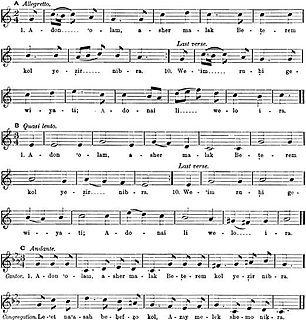
Adon Olam is a hymn in the Jewish liturgy. It has been a regular part of the daily and Shabbat (Sabbath) liturgy since the 15th century.
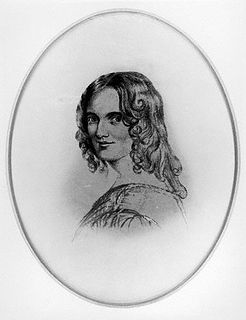
Sarah Fuller Flower Adams was an English poet and hymnwriter, best known for writing the words of the hymn "Nearer, My God, to Thee".
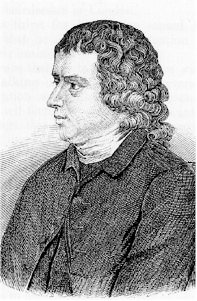
"Come Thou Fount of Every Blessing" is a Christian hymn written by the pastor and hymnodist Robert Robinson, who penned the words in the year 1758 at the age of 22.
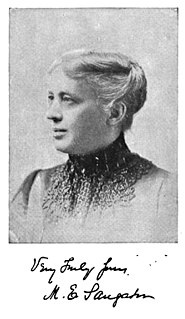
Margaret Elizabeth Sangster was an American poet, author, and editor. Her poetry was inspired by family and church themes, and included hymns and sacred texts. She worked in several fields including book reviewing, story writing, and verse making. For a quarter of a century, Sangster was known by the public as a writer, beginning as a writer of verse, and combining later the practical work of a critic and journalist. Much of her writing did not include her name.
Eliza Lee Cabot Follen was an American writer, editor, and abolitionist. In her early life, she contributed various pieces of prose and poetry to papers and magazines. In 1828, she married Prof. Charles Follen, who died on board the Lexington in 1840. During her married life, she published a variety of popular and useful books, all of which were characterized by her Christian piety. Among the works she gave to the press are, Selections from Fénelon, The Well-spent Hour, Words of Truth, The Sceptic, Married Life, Little Songs, Poems, Life of Charles Follen, Twilight Stories, Second Series of Little Songs, as well as a compilation of Home Dramas, and German Fairy Tales. Holding an interest in the religious instruction of the young, she edited, in 1829, the Christian Teacher’s Manual, and, from 1843 to 1850, the Child’s Friend. She died in Brookline, Massachusetts in 1860.
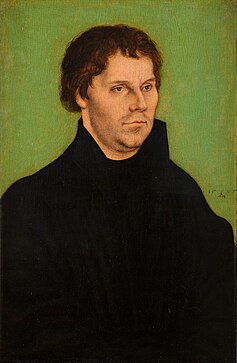
"Nun bitten wir den Heiligen Geist" is a German Christian hymn. The first stanza is a leise from the 13th century which alludes to the Latin sequence Veni Sancte Spiritus for Pentecost. It was widely known, and aside from its Pentecostal origin was also used as a procession song and in sacred plays.

"Jesu, meine Freude" is a hymn in German, written by Johann Franck in 1650, with a melody, Zahn No. 8032, by Johann Crüger. The song first appeared in Crüger's hymnal Praxis pietatis melica in 1653. The text addresses Jesus as joy and support, versus enemies and the vanity of existence. The poetry is bar form, with irregular lines from 5 to 8 syllables. The melody repeats the first line as the last, framing each of the six stanzas.
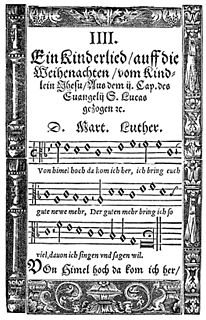
"Vom Himmel hoch, da komm ich her" is a hymn text relating to the Nativity of Jesus, written by Martin Luther in 1534. The hymn is most often sung to a melody, Zahn No. 346, that first appeared in 1539 and that was likely composed by Luther as well. That version became a classic Christmas carol, and many composers referred to it in their compositions.

Annie Sherwood Hawks was an American poet and gospel hymnist who wrote a number of hymns with her pastor, Robert Lowry. She contributed to several popular Sunday school hymnbooks, and wrote the lyrics to a number of well-known hymns including: "I Need Thee Every Hour"; "Thine, Most Gracious Lord"; "Why Weepest Thou? Who Seekest Thou?"; "Full and Free Salvation" and "My Soul Is Anchored".
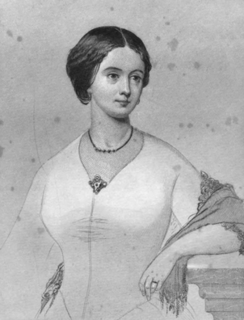
Amelia B. Coppuck Welby was a 19th-century American fugitive poet. In 1837, under the pen-name "Amelia," she contributed a number of poems to the Louisville "Journal," acquiring a reputation as a notable poet. She published in 1844 a small volume of poems, which quickly passed through several editions. It was republished in 1850, in New York City, in enlarged form, with illustrations by Robert Walter Weir. Though many of her poems were on the subject of death, including "The Bereaved", "The Dying Girl", "The Dying Mother", "The First Death of the Household", "The Mournful Heart", and "Sudden Death", she was one of the most popular poets in the South before the Civil War.
Phoebe Hinsdale Brown was the first notable American woman hymnwriter, and the first American woman to write a hymn of wide popularity, "I love to steal awhile away".
Jane Lundie Bonar was a Scottish hymnwriter. Her hymn, "Pass away, earthly joy!", first appeared in 1843 in Songs for the Wilderness. Two years after, it reappeared in The Bible Hymn Book, compiled by her husband, Horatius Bonar, and was reprinted in the United States with other names appended.
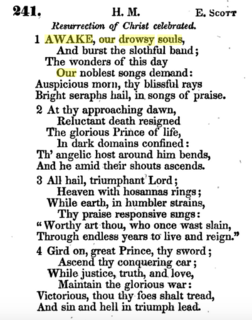
"Awake, our drowsy souls" was a Christian hymn by Elizabeth Scott.
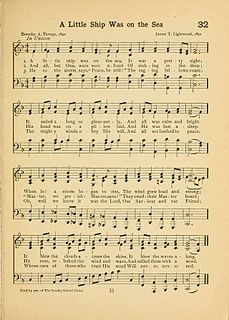
Dorothy Ann Thrupp was a British psalmist, hymnwriter, and translator. Many of her psalms and hymns, which were published under various pseudonyms, were included in: Friendly Visitor ; Children's Friend ; Selection of Hymns and Poetry for the Use of Infant Schools and Nurseries ; Hymns for the Young ; and Thoughts for the Day. Thrupp was the author of Thoughts for the Day that was published in 1837, and Songs by the Way. In addition to these, her hymns were published in magazines edited by Caroline Fry.
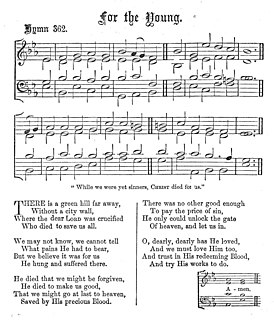
"There is a green hill far away" is a Christian hymn, originally written as a children's hymn but now usually sung for Passiontide. The words are by Cecil Frances Alexander, and the most popular tune by William Horsley.
















